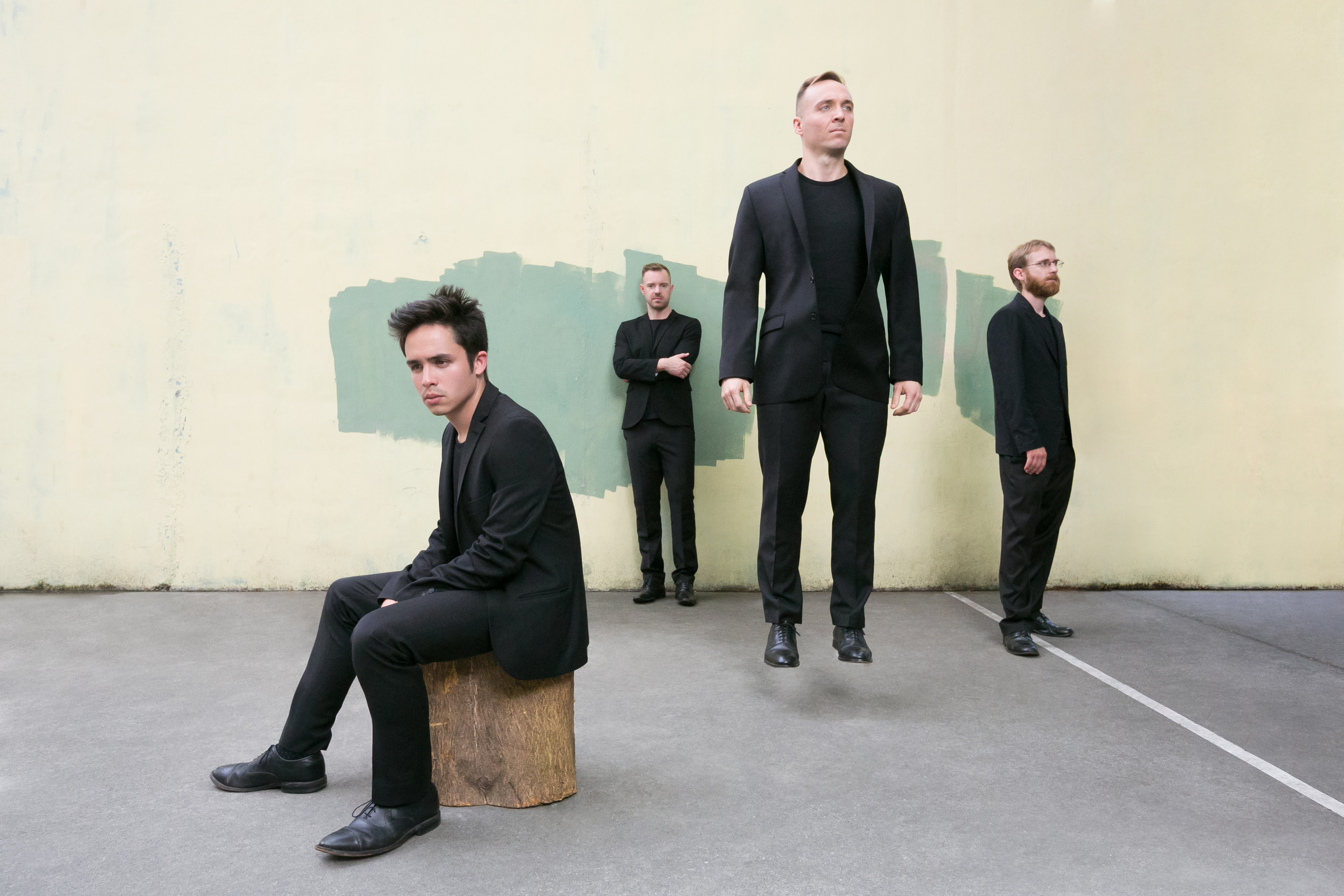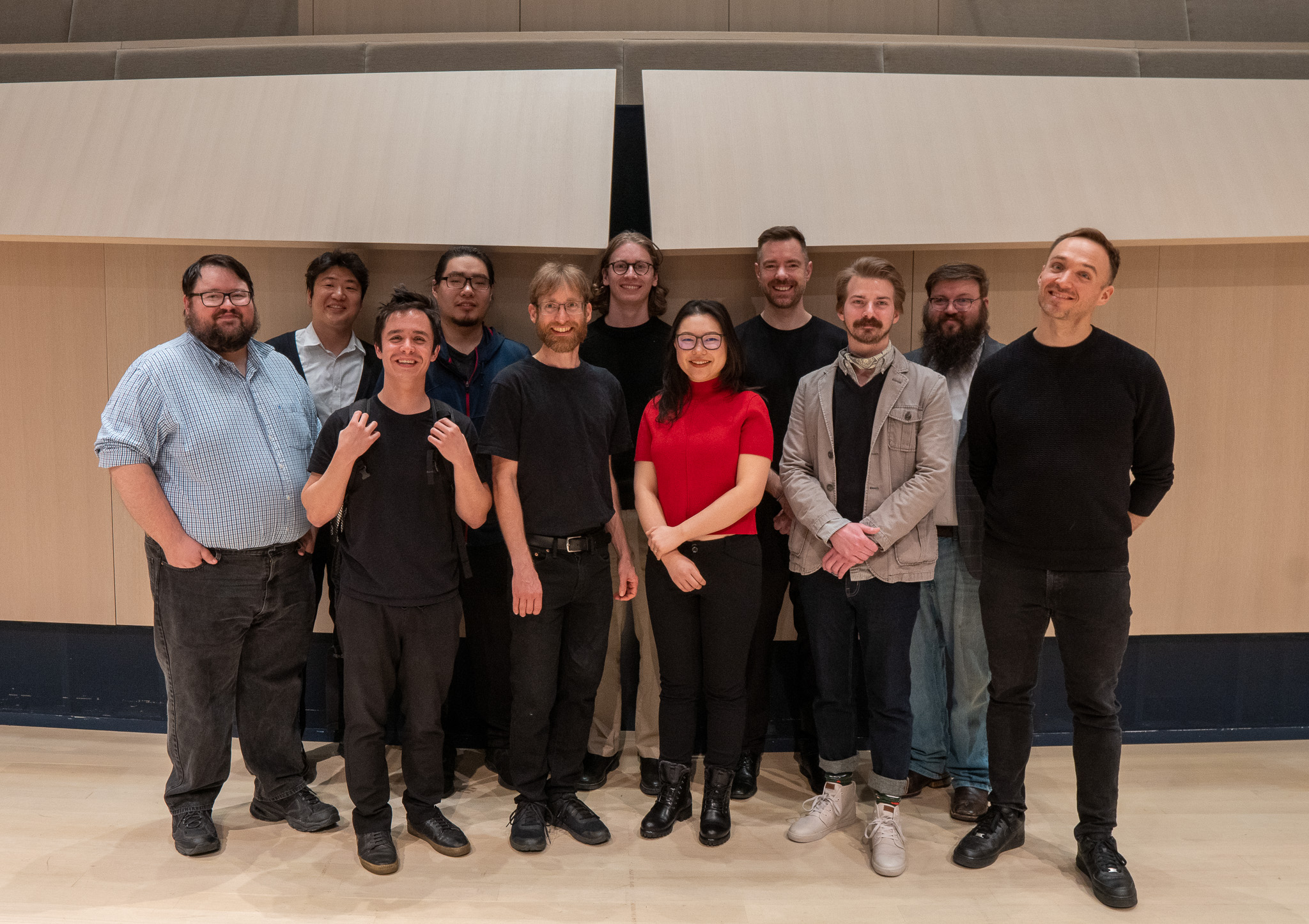JACK Quartet II
Thursday, March 30, 2023 at 7:30p, Concert Hall
Program
Ghosts We Call Ourselves (String Quartet No. 5)I. A Concept Like HeavenII. A Bone White Cathedral III. No Concept of Heaven IV. The Drying of Clouds V. Pillars of Marble and Salt VI. A Lavender Emptiness VII. Strings of Colored Light VIII. Ghosts |
Matt MASON |
Suite for String Quartet (based on a Korean folk song)I. Prelude II. Allemande III. Courante (attacca) IV. Sarabande (attacca) V. Loure |
Sanggeun CHOI |
Chorus, a string quartet |
Sean HARKEN |
Aspledon Undae, for string quartet (2022) |
Greg EVANS |
intermission
Warp & Weft, for string quartet and electronics (2023)Part I. WarpPart II. Weft Part III. Web Part IV. Weave |
Stefan CARLSON |
Moksha, for string quartet |
Qing XU |
Wandering on the Border of Infinities |
Ziang HAN |

JACK Quartet Bio
Hailed by The New York Times as “our leading new-music foursome”, the JACK Quartet is one of the most acclaimed, renowned, and respected groups performing today. JACK has maintained an unwavering commitment to their mission of performing and commissioning new works, giving voice to underheard composers, and cultivating an ever-greater sense of openness toward contemporary classical music. The quartet was selected as Musical America’s 2018 “Ensemble of the Year”, named to WQXR’s “19 for 19 Artists to Watch”, and awarded an Avery Fisher Career Grant.
Through intimate relationships with today’s most creative voices, JACK embraces close collaboration with the composers they perform, leading to a radical embodiment of the technical, musical, and emotional aspects of their work. The quartet has worked with artists such as Julia Wolfe, George Lewis, Chaya Czernowin, Helmut Lachenmann, Caroline Shaw, and Simon Steen-Andersen. JACK’s all-access initiative, JACK Studio, commissions a selection of artists each year, who will receive money, workshop time, mentorship, and resources to develop new work to be performed and recorded by the quartet.
Committed to education, JACK is the Quartet in Residence at the Mannes School of Music, who host the JACK Frontiers Festival, a multi-faceted festival of contemporary music for string quartet. They also teach each summer at New Music on the Point, a contemporary chamber music festival in Vermont, and at the Banff Centre for Arts and Creativity. JACK has long-standing relationships with the University of Iowa String Quartet Residency Program, where they teach and collaborate with students each fall and spring, as well as with the Lucerne Festival Academy, of which the four members are all alumni. Additionally, the quartet collaborates with young composers at schools including Columbia University, Harvard University, New York University, Princeton University, and Stanford University.
Comprising violinists Christopher Otto and Austin Wulliman, violist John Pickford Richards, and cellist Jay Campbell, JACK operates as a nonprofit organization dedicated to the performance, commissioning, and appreciation of new string quartet music.
Program Notes & Bios
Matt Mason is a composer and pianist from Illinois, currently pursuing a Ph.D at the University of Iowa. His compositions represent an intersection of poetry, theater, and music creating a psychogram where melodic, harmonic, and intervallic elements are dictated by tense constellations and brooding undertones. Matt has worked with noted ensembles such as Ensemble Dal Niente, Random Access Music, Hypercube, and the JACK Quartet.
The Suite for String Quartet stands as a moss-grown expression of the deepest aesthetic sense between Korean musical tradition and Western classic musical form. With the basic idea that represents the mixture of the two different aesthetics under those old-fashioned materials, four strings include a sonorous sound graced by means of modernistic gestures.
Based on a suite form that generally consists of five different dances and movements found in the Western canon, the quartet conveys an evocation of exoticism through Korean musical materials revolving around traditional tunes and sophisticated pulses. Especially in the Suite form motivated by the Baroque era, a Korean folk tune, About five hundred years, is mainly described as a crucial tone color, giving a variety of contrapuntal textures throughout the five distinctive movements: Prelude, Allemande, Courante, Sarabande, and Loure. Following the blending concept, the Korean tune is occasionally characterized in accordance with Baroque musical nuances; a solo cello’s fast transition heading to Sarabande imitates the arpeggio rhythms from an excerpt, the beginning of the Prelude of J. S. Bach’s Cello Suite No.1.
With the expectation that the suite for String Quartet gives rise to an evocation of classical reminiscences, I hope it brings about a new exotic sense through a mixture of Korean tunes and Western musical languages in modern art music.
Sanggeun Choi is a Korean composer and pianist. His primary identity for music is based on the Korean musical aesthetic sense from traditional themes and materials, accompanied by Western musical techniques. In the most prestigious music competition, the 38th Joongang Music Concours in South Korea, he won the second prize with a duo piece, Aulim for Two Pianos which stood for his idea of harmonization between two different concepts. Sangguen’s work has been performed on the international stage around Korea, the United States, China, Japan, Oman, and England. In 2018, Sanggeun presented his representative orchestral work, Arirang Fantasy, at the Vibration for Visualized Sound Concert in the United Kingdom, and it was broadcast on a documentary program on BBC Radio. He is currently pursuing his Ph.D. degree in music composition and theory at the University of Iowa with Jean-Francois Charles and David Gompper. He holds a Master of Music degree in composition from Mannes School of Music The New School in New York City where he studied with Dr. Paul Moravec.
Chorus is a piece that explores minute differences between multiple of the same or similar musical elements. The piece opens by exploring similar short melodies played in oscillating polyrhythmic patterns on top of one another. As these short melodies are expanded, a melodic superstructure that links those musical fragments together is revealed. Then, the piece shifts its focus from rhythmic minutia to tiny differences in pitch using microtones through the use of that melody. The piece also deals with the morphing of time. Oftentimes the short musical fragments are played in half-speed or double-speed in quick succession. As Chorus draws to an end, both elements of rhythm and pitch minutia are combined, with a microtonal layer of exploration added upon the polyrhythmic structure of the start of the piece to draw it to a close.
Sean Harken is a composer and bass-baritone vocalist from Iowa City, IA. He is in his second year of pursuing a B.M. in Composition Studies at the University of Iowa, where he studies composition with Jean-François Charles and voice with Stephen Swanson. He has previously studied composition with Ramin Roshandel. He often writes pieces for the voice and small chamber ensembles. His works have been performed by the AMF Contemporary Music Ensemble, and Quartet Contemporaine.
Warp and Weft, for string quartet and electronics, is the fruit of several years of exploration and experimentation. The title is borrowed from a pair of fantasy tales–– the Kingmaker, Kingbreaker series by Karen Miller; and the Exiles trilogy by Melanie Rawn–– both of which use variations of the phrase to describe the texture and contruction of magic. For my part, with this piece I pursued an interest in taking inspiration from some of the constituent elements of the musical experience, with regards to acoustics as well as perception. I wanted to play with envelope as a source of inspiration for the composition of phrase; with the perceptual experiences of emergent order and alignment found in phasing and other similar processes and arrangements of sound.
Warp and Weft is also a celebration of what I've loved most about my musical life so far. Stabs and swells of choral clusters; klanging clouds of beaten metals, sizzling string strokes, and peals of electronically concocted booms, scrapes, and womps; greasy blasts of digital noise; sonorous walls of sound. Many of my favorite flavors, joined together in one place.
Finally and most significantly Warp and Weft was created as the capstone of my work at the University of Iowa, my doctoral dissertation. So much work has gone into reaching this point. I have learned so much, and yet perhaps little is more apparent to me than that I still have so much to learn. It is my hope to complete this chapter of my career sucessfully, and to move into the next with a continued dedication to playful exploration and learning.
Stephan Carlson (b. 1990) is a composer, song-writer, and music educator from northern Illinois. Stephan's musical compositions tend to occupy a cross-section of several areas: vocal musics including choral, a cappella, and barbershop music; instrumental music, largely informed by acoustic analysis and the study of the executive idioms required for sound production; and electronic music, often a blend of noise synthesis and experimental spectral techniques coupled with idioms from popular music like rock and metal.
Stephan completed his B.M. in Music Theory and Composition at Elmhurst college in 2013, and then his M.M. in Composition at Northern Illinois University in 2019. Stephan a Ph.D. candidate at the University Iowa, and currently lives in Maryland with his wife.
Moksha, a term found in Hinduism and various Indian religions, refers to the liberation from the cycle of death and rebirth. It is a concept of spiritual enlightenment and the freedom from suffering. Generally, it is associated with the idea of a higher state of consciousness that goes beyond earthly attachments, focused on transcending a physical existence and attaining a state of bliss and unity with the divine.
In creating a surreal and wispy atmosphere and building a mysterious and otherworldly feel, I explored sonic materials by experimenting with various pitch combination. The piece begins with high pitches, which are then joined by a series of harmonic notes that gradually build in intensity. This creates a sense of anticipation and a feeling of being on the brink of something unknown. As the piece progresses, the notes become more complex and the intensity increases. Additionally, the application of homophonic textures both in the opening and closing of the works haunts the dreamlike setting.
Qing Xu received her bachelor’s degree in Music Composition from Shenyang Conservatory of Music, where her piano suite was nominated as finalist for the 8th Chinese Music Golden Bell Award. After graduation, she joined the keyboard department at the Northeastern Petroleum University in 2016, serving as a piano instructor and accompanist. She is currently in the MA program in composition at the University of Iowa.
Wandering on the Border of Infinities - This composition is inspired by the construction of a string instrument itself. I imagine the bridge as a metaphorical border, a place that cannot be confined within time or space, filled with mysterious air. As you are wandering around it (above or below the bridge), unknown and strange fields start to emerge and disappear. Sometimes you just look at them from afar, sometimes you find one that is very tempting, and you walk into it….
Ziang Han, (b.1995) is a composer and pianist who completed his Bachelor of Arts Degree at Capital Normal University in China, studying music composition and piano performance. In 2018, he came to the United States to purse his Mater of Music in Music Composition at University of Hartford, during which he was awarded the Edward Clemente Prize for music creativity and contribution to the community. Under the Pelzer Prize fellowship, he started his PhD in Composition at the University of Iowa in 2021.
He has composed with various conventional instrumentations and gradually cultivated his personal voice through more adventurous settings. One of his recent projects, In the Abyss… Sheening… Weathering, is scored for two tubas, one prepared piano and one mezzo-soprano. His latest composition K•Y√.£..¶∆R•Ï…?Ë™ is for the UI Klais organ and 12 spatialized speakers. It was premiered in the Concert Hall at the University of Iowa.
Ziang has worked with Duo Yumeno (shamisen/cello), Loadbang (baritone voice/trumpet/trombone/bass clarinet), the New Zealand String Quartet, and the New Zealand String Trio.
